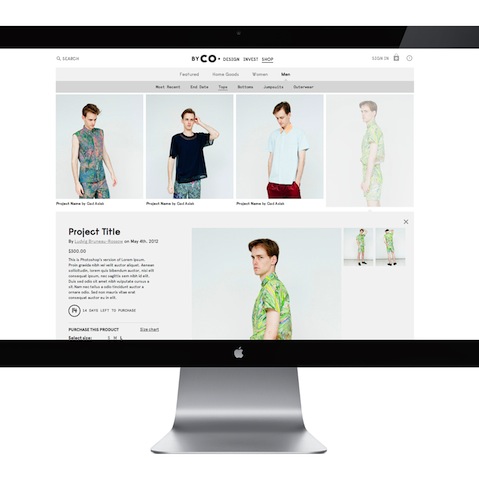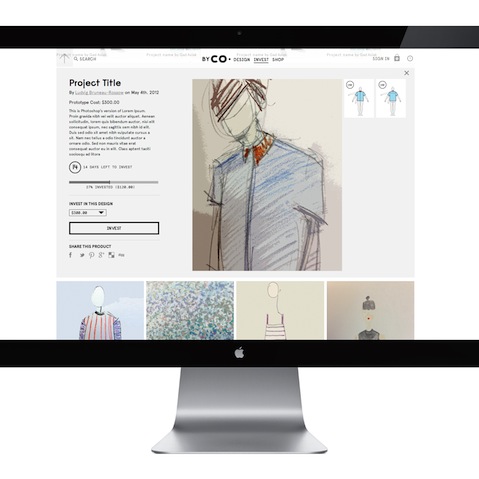The Future of Fashion Retail: Jesse Finkelstein

Photo: Courtesy of Jesse Finkelstein
Ask any emerging designer about the biggest problems in their business, and they will most likely complain about securing investors or finding the right manufacturers for their products. And while a lot of fashion-tech startups were eager to tackle consumer problems such as personal recommendations and sizing, there hasn't been a lot of innovation when it comes to helping designers deal with mundane, everyday tasks (logistics anyone?). Granted, Kickstarter has been successful in offering cash (and publicity) to aspiring fashion entrepreneurs, but money is only one side of the problem.
New York-based startup Byco, founded by Jesse Finkelstein, a retailer and manufacturer behind the label JF & Son, and his sister Meredith, would like to offer another helping hand. Their idea? The creation of a micro-financing platform that not only relieves designers from the trouble of getting funding, but also deals with heavy duties like production and sales.

How does it work? Byco encourages you to submit a design, promote it to potential investors in order to have the prototype costs covered, and gives you the option to sell your design on their site for a month. The company handles production and fulfilment and everybody (including investors) gets a cut from the sales. With the company trying to “let designers be designers,” as he said in the New York Times, Jesse shared details on Byco's intriguing business model as well as his views on the future of fashion retail.
How did you come up with the idea of Byco and what kind of problems does it address?
As someone who designs and manufactures clothing, I’m aware of two major obstacles facing designers: financing and production. There are plenty of great small designers out there who cannot afford the sampling process, and even if they can, they do not have the resources to affordably produce their pieces. Byco addresses these two problems quite clearly: crowdfunding provides the financing and we handle all the sales, distribution, and production. A lot of people just want time to design, they don’t want to have to navigate the world of factors, distributors, reps, etc. — Byco allows designers to design. I think the other issue, which social media sites are being tested on, is how to reward people for all their curatorial energy. We spend so much time on Pinterest and Tumblr crafting mood boards and inspiration, and I think creative energy should be compensated. On Byco you’ll have the option to open up your own store, and you’ll receive a commission on any piece you sell off it. We want to collapse that distance between curating and e-commerce.
Could you talk us through the creative process surrounding each design submitted? Do you have the authority to approve or disapprove a design and/or make changes to it?
Anyone can submit a design for women’s and men’s clothing and home accessories. We have a fairly intuitive submission page that walks you through the process of choosing the style you want to design, downloading our technical croquis or using a flat from our library, picking fabrics or submitting a print, and then previewing how it will appear on the Fund page. If we have questions about your design, we’ll reopen the project and ask you to fill in the details. We have the authority to reject any design, either because it is completely unintelligible or because we don’t think it’s appropriate for our site. If we see a way of making a design better we’ll offer our thoughts to the designer, but it’s up to them.
What kind of retail channels are you using, and how do you solve such problems as logistics, import duties, and so on?
Our primary retail channel is the website. Eventually we’ll be partnering with other stores. I’ve been producing clothes for the last six years, so I’m fairly accustomed to the logistics side. Import duties aren’t so much a problem as is cost, which you always have to account for when you’re pricing out a design.

What were the challenges that you faced in order to get your business model right? How are you dealing with current legislation, given the US laws regarding accredited investors?
We were hoping that the Jobs Act would be fully legislated by now, thus allowing for non-accredited investors to receive a portion of sales from the designs they funded. We’ve since had to modify the terms; instead of receiving equity, funders are given a Byco Store, where they can sell their funded designs and receive an automatic 10% of sales as commission.
What are the ways in which crowd-funding sites currently interact with fashion? Do you see any new models of production and/or consumption because of them?
I can’t think of any fashion crowd-funding sites that take on the role of manufacturer. With something like Kickstarter designers can raise money to produce a collection, but they are still responsible for producing it. The alternative is these “democratising fashion” sites that allow users to vote on a design, which then gets produced. I don’t believe in design by committee. I think if you have a good design it should receive financing.
Currently, a lot of fashion brands are focusing on quality content. How important is content to you, and in your view, how is it affecting the world of fashion ecommerce?
Content is crucial. Major brands don’t have a monopoly on the discourse anymore, which has forced them to create more powerful narratives. However, these major brands have it backwards. They want people to become part of their narrative — featuring users, customers, etc. — the most exciting thing I’ve seen with Byco is the way people incorporate the experience with the site into their own lives. They’re posting about their design experience on Facebook, Tumblr, etc. Byco is becoming part of their story, rather than us leveraging them to create content around our story. That’s not to say we won’t feature designers, funders, and shoppers, but it’s more important for us to figure out ways for people to create content with their experience on Byco.

As ecommerce continues to grow, how do you see physical retail spaces responding to this challenge? Do they need to focus more on creating concepts and offering a richer in-store experience?
Now is one of the most exciting times to have physical retail, because everything we know about it is changing. I hate the idea of lifestyle brands, but I do think that you can’t just sell clothes anymore; you need to sell books, home accessories, music, etc. If people are going to make the effort to buy clothes from you, then they’re going to want to know your opinion on everything else.
How does social media influence the way people interact when it comes to shopping? Do you believe that Facebook or Pinterest could offer a satisfactory integrated shopping experience?
Maybe. They certainly allow people to provide detailed information about their experiences — but no more so than Amazon. As they are companies that don’t actually produce anything, I think it will be difficult for them to figure it out.
Collaborative consumption, personalised recommendations, social shopping: Are there any online trends that have the potential to disrupt fashion retail right now?
I think crowdfunding will. People don’t shop the same way anymore. All of these shows and collections seem absurd. We purchase clothing like we do music — piece by piece. Once designers are given the power to start making things without all the distractions of running a business we’re going to see people taking an even more personal approach to consumption.
What will fashion shopping be like in the near future?
I believe shoppers will be more and more hungry for information, and feel more and more empowered to dictate style and trends.



